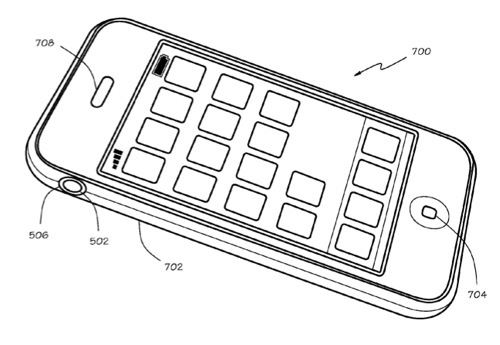An Apple patent (number 200100216526) for an audio jack with included microphone has appeared at the US Patent & Trademark Office. Embodiments of the invention relate to the field of electrical connectors; and more specifically, to electrical connectors that include a microphone.
Described is a connector for receiving a cylindrical plug includes a body defining a plug aperture and a cavity for receiving the cylindrical plug. A plurality of electrical contacts in communication with the cavity make electrical connections with the cylindrical plug and retain the cylindrical plug. A microphone is coupled to the body such that the plug aperture and the cavity provide an acoustic path to the microphone. The microphone may be at an end of the connector opposite the plug aperture or on a side of the connector adjacent the plug aperture. The connector allows a microphone to be added to a device, such as a mobile telephone, without the need for an additional external aperture. The microphone in the connector may operate with a second microphone and processing electronics in the device to provide audio processing functions such as noise cancellation or audio beamforming. The inventors are Shaohai Chen, Phillip George Tamchina, Richard Hung Minh Dinh, Jae Han Lee, Trent Weber, Michelle Yu and Adam D. Mittleman.
Here’s Apple’s background and summary of the invention: “Handheld computing devices, “palmtops”, “palmhelds”, personal digital assistants (PDAs), or handheld computers typically weigh less than a pound and fit in a pocket. These handhelds generally provide some combination of personal information management, database functions, word processing, and spreadsheets as well as voice memo recording and telephony functions. Because of the small size and portability of handhelds, strict adherence to hardware constraints, such as input hardware, must be maintained. It is conventional to have buttons or switches on the handheld computer for providing user input to the handheld computer. Handheld computers may also include one or more electrical connectors that provide for connecting auxiliary devices to the handheld computer.
“If the handheld computer includes a microphone, a sound input aperture is conventionally located at some discrete location on the handheld computer housing, using limited housing real estate on the handheld computer. Other conventional implementations of sound input devices for handheld computers include external microphone devices that may be plugged into an electrical connector. In addition to using housing real estate, sound input apertures and electrical connectors introduce openings in the housing and breach the barrier that protects components inside the housing.
“Accordingly, there is a need to minimize the requirement for openings in a housing of a handheld device to accommodate microphones and electrical connectors.
“A connector for receiving a cylindrical plug includes a body defining a plug aperture and a cavity for receiving the cylindrical plug. A plurality of electrical contacts in communication with the cavity make electrical connections with the cylindrical plug and retain the cylindrical plug. A microphone is coupled to the body such that the plug aperture and the cavity provide an acoustic path to the microphone. The microphone may be at an end of the connector opposite the plug aperture or on a side of the connector adjacent the plug aperture. The connector allows a microphone to be added to a device, such as a mobile telephone, without the need for an additional external aperture. The microphone in the connector may operate with a second microphone and processing electronics in the device to provide audio processing functions such as noise cancellation or audio beamforming.”



